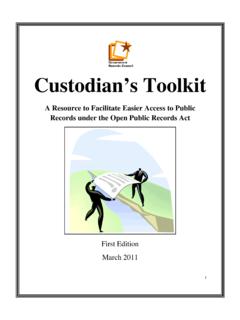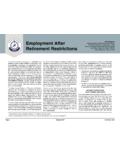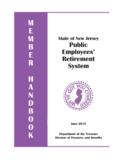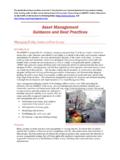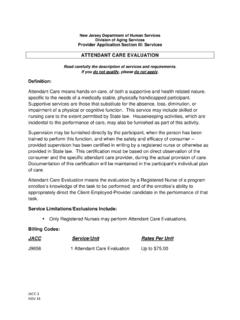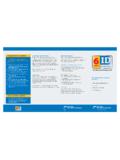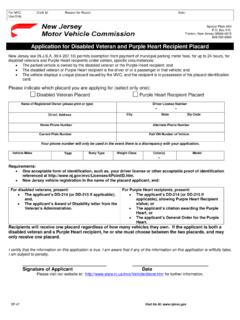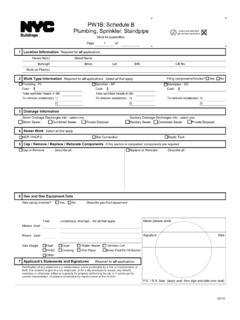Transcription of The New Jersey State Uniform Construction Code
1 The New Jersey State Uniform Construction Code What It ls The New Jersey State Uniform Construction Code (UCC) Act, which was signed into law in 1975, authorizes the Commissioner of the Department of Community Affairs to adopt and enforce rules pertaining to Construction codes and provides for the administration and enforcement of those rules throughout the State . The Uniform Construction Code ( . 5:23), which was promulgated in 1977, contains the UCC Act and all rules issued under the Act relating to the administration and enforcement of Construction regulations. The UCC is comprised of four basic technical subcodes for Construction : building, electrical, fire protection, and plumbing . In addition, the UCC contains technical subcodes for fuel gas installations; mechanical installations; one- and two-family dwellings; accessible (barrier free) Construction ; the rehabilitation of existing buildings;. the Construction of manufactured homes; asbestos hazard abatement; radon hazard abatement; and playground safety.
2 In short, the UCC is a complete set of technical standards for Construction with a Uniform method of administration and enforcement. How It Works For each technical subcode of the UCC, the Department adopts by reference national model Construction codes, which, in turn, contain references to national performance technical standards used in Construction . The technical standards contain more detailed specifications for a particular aspect of Construction . The national model codes incorporate by reference standards that are appropriate to their subject. For example, the adopted building subcode for New Jersey is the 2018 edition of the International Building Code (IBC/2018), which references technical standards that are developed and published by such organizations as the American National Standards Institute, the American Society of Testing and Materials, and the National Fire Protection Association and that apply to accessibility, heating and ventilation, and fire sprinkler requirements.
3 The UCC provides one stop service at the local level. A Construction permit is required for a Construction project. This permit includes technical subcode applications for building, electrical, fire protection, mechanical, or plumbing work. A Construction permit is required for any new Construction as well as for work on existing buildings, including structural, plumbing , mechanical, and electrical work. There are some exceptions to the general permit requirement. For example, Construction permits are not required for ordinary maintenance, which includes routine repair. Property owners or contractors are responsible for obtaining Construction permits and for submitting any required fees. The State adopts a fee schedule that applies to work performed by the State . Municipalities adopt their own fee schedules by ordinance. 1. Information about fee-schedules for an individual municipality may be obtained from that local enforcing agency.
4 Applications for Construction permits are submitted to local enforcing agencies. Under the UCC, local enforcing agencies are required to act on Construction permit applications, including building plans and specifications, within specific timeframes. Not later than 20. business days after the submission of a complete application, the permit application must be released or denied. Construction work may begin when the Construction permit is issued. If plans and specifications have been submitted with the Construction permit application, the plans and specifications must be approved before the commencement of work. Plans and specifications are required for new Construction and for work in existing buildings. During Construction , the code official or inspector conducts regular inspections to ensure that the work performed complies with the UCC. The permit applicant is responsible for notifying the local enforcing agency that the project is ready for inspection.
5 The inspection must be performed within three days of the notification. As the Construction project approaches completion, the permit applicant notifies the local enforcing agency that it is ready for the final inspections. At this time, the permit applicant also applies for a Certificate of Occupancy. When the project has passed the final inspections and it has been determined that the project complies with the UCC, that all required fees have been paid, and that the conditions of any prior approvals have been met, the Construction official issues a Certificate of Occupancy. A Certificate of Occupancy verifies that the Construction work authorized by the Construction permit has been completed in accordance with the UCC. Who Enforces It In New Jersey , State -licensed, municipally employed code enforcement professionals- . Construction officials, subcode officials, and inspectors--are responsible for the enforcement of the UCC.
6 A Construction official is a State -licensed code enforcement official who is responsible for administering the UCC within the jurisdiction of the enforcing agency. Construction officials oversee subcode officials and inspectors, but a Construction official cannot overrule a subcode official on a technical issue in a field in which the Construction official does not hold a license. A subcode official is a State . licensed code enforcement official who implements the provisions of a specific technical subcode of the UCC and oversees the technical and administrative provisions of that subcode. Inspectors are State -licensed code enforcement officials who enforce the requirements of a specific technical subcode, but do not oversee the administrative provisions of that subcode. The primary responsibility of code enforcement professionals is to protect the health, safety, and welfare of New Jersey 's citizens. To accomplish this, Construction officials and subcode officials review Construction permit applications to ensure that building 2.
7 Plans and specifications conform to the UCC and inspectors perform field inspections for Construction projects to ensure that the Construction is in accordance with the UCC. In certain instances, the State has responsibility for code enforcement. In such cases, the State performs the plan review while the local enforcing agency retains the responsibility for performing the field inspections. The UCC specifies which projects require the involvement of the State . These include casinos, hospitals, and State -owned buildings. If you have questions about the Uniform Construction Code and how it works, please see the two-part General Information guidance that follows. In addition, you may contact the Code Assistance Unit at (609) 984-7609. 3. State of New Jersey GENERAL INFORMATION. Department of Community Affairs Division of Codes and Standards BASIS OF BUILDING REGULATION. New Jersey 's Construction codes and standards grew out of two important public purposes: To safeguard the public's health, welfare and life safety in buildings; and To ensure that Construction is affordable and promotes the growth of the State economy Consistent model codes and standards have helped make Construction more affordable by enabling building product manufacturers to standardize their products around a common set of laws, codes and standards.
8 The Construction codes and standards govern: Fire Protection Electrical Structural Loads Mechanical and plumbing Systems . Accessibility Energy Conservation Elevators . Protection against Wind, Seismic and Flood Events The Uniform Construction Code (UCC) is a complete set of technical standards for Construction with a Uniform method of Subcodes administration and enforcement in order to protect the public's health, safety and welfare. The UCC establishes clear and predictable requirements for Construction throughout New Je(sey. There are no separate, local requirements. plumbing The UCC contains the rules relating to the Construction , repair, renovation, alteration, rehabilitation, maintenance, occupancy and use of buildings and structures. Reh bilitafion*. *Further information can be found at Did you know?..Permit applications and related forms, rule adoptions and proposals, code official licensing information, consumer information and programs, and much more useful information is on our website at www , ;tdt::a/ odes 1.)
9 Before undertaking the Construction or alteration of any building or structure, the owner or his agent (who may be the engineer, architect or contractor) is responsible for obtaining the Construction permits from the local code enforcement agency. A Construction permit is required for: Any new Construction ' Suspention 0t, Perm . Work on existing buildings including structural, plumbing , mechanical, and electrical work The enlargement, repair, renovation, alteration, reconstruction or demolition of a structure Note: Construction permits are not required for ordinary maintenance, which includes routine repairs. Required fees must be submitted with the permit application. Municipalities adopt their own fee schedules by ordinance. Information about fee schedules for an individual municipality may be obtaining from that local enforcing agency. Applying for Construction Permits Under the UCC, local enforcing agencies process Construction permit applications, including plans and specifications.
10 The application for a permit is submitted on the standard Code Permit Application form.* The application requires a general description of the proposed work, its location, the use and occupancy of all parts of the building or structure, portions of the site or lot not covered by the building or structure, and additional information as required by the Construction official. The local enforcing agency must release or deny the application not later than 20 business days after the submission of a complete application. Plans and specifications are required for new Construction and for work in existing buildings. If plans and specifications have been submitted with the Construction permit application, the plans and specifications must be released before the commencement of work. Construction may begin once plans are released and the permit is issued. Application for a permit is made by the owner or his agent (who may be a licensed engineer or architect, or a plumbing , electrical or other contractor employed in connection with the proposed work).
